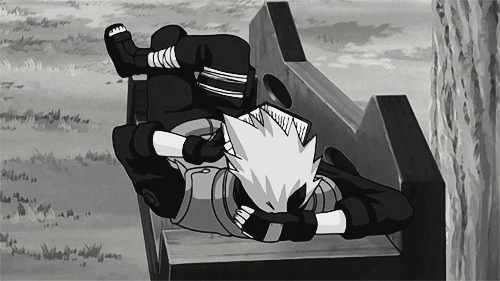 |
| From now on, every post about books will have a picture of Kakashi reading. |
Continuing Great Reads Quarterly '13...
These book reactions were supposed to be posted last month... Right now I'm reading more short stories (that can be finished in a sitting) than novels. From April to June, I've been reading so few books.
Caedmon's Song by Peter Robinson (1990)
It was going to be a long haul, this recovery, Kirsten thought with a sudden chill of fear. It wasn't going to be easy at all.
In the topic of serial killers, it seems that more is said about the psychology and life of the killer than his victims. Killers fascinate and scare us, but most of the time their victims are just statistics.
What if a victim survives a vicious and brutal attack? I never thought about that myself until I read Caedmon's Song. Kirsten, a graduating university student, celebrates her last days in university with her friends by partying. However, she wakes up days later in a hospital, her body barely held together by stitches and having no memory of what happened. Due to damage from stabbings, her womb was removed. Life changed, but the killer is still out there. She decides to hunt him down herself and kill him, not only for revenge for herself but also for the other victims already dead, and to prevent him from killing more. She wasn't satisfied with the police investigations, and took it upon herself to deliver justice.
The book focuses more on Kirsten, the serial killer doesn't show up until the last few chapters. What's striking is how people treated her after the attack, saying that "she almost got herself killed" as if it was her fault, not the killer's. Instead of sympathy, she just got more hostility. The downward spiral that started from the attack was also depicted well, and her alienation from friends and family. In the end, it was a triumph for her. It's a good story about revenge. (Yeah, my words don't do it justice.)
No matter how bleak some of the possibilities seemed, she felt free at last. Even imprisonment would be a kind of freedom now. It didn't really matter what happened because she had done what had to be done. Now she was free.
The works of Catherynne M. Valente
I haven't finished reading her novels Deathless and Palimpsest yet, I go slow, the words better savored that way. Valente's use of language, her twisting words into iridescent images and spell-binding poetry, is overwhelming. Reading her written words illicit a physical reaction in me: I feel cold, I feel the little hairs on my nape tingle, I feel mild shocks through my spine. I'm not exaggerating. Mere words can make me feel that, and I read her sentences over and over to feel them again. Its almost like a drug. Very few writers make me feel that. I only ever finished her short stories online. I recommend "How to become a Mars Overlord", "The Harpooner at the Bottom of the World", "The Wolves of Brooklyn", and "Secretario". Valente is known for re-envisioning legends, folklore, mythologies, histories both real and imagined, blending science fiction and fantasy. Her voice is unique.
I would sacrifice a hand to write like that. Or my liver, because if its my hand then I can't type.
The Hundred Thousand Kingdoms by N.K. Jemisin was very good and complex, and at the moment I can't form an adequate summary or review, and the book is the first of a trilogy. I'm halfway through Book 3. I'll probably write a post after I finish it.


No comments:
Post a Comment